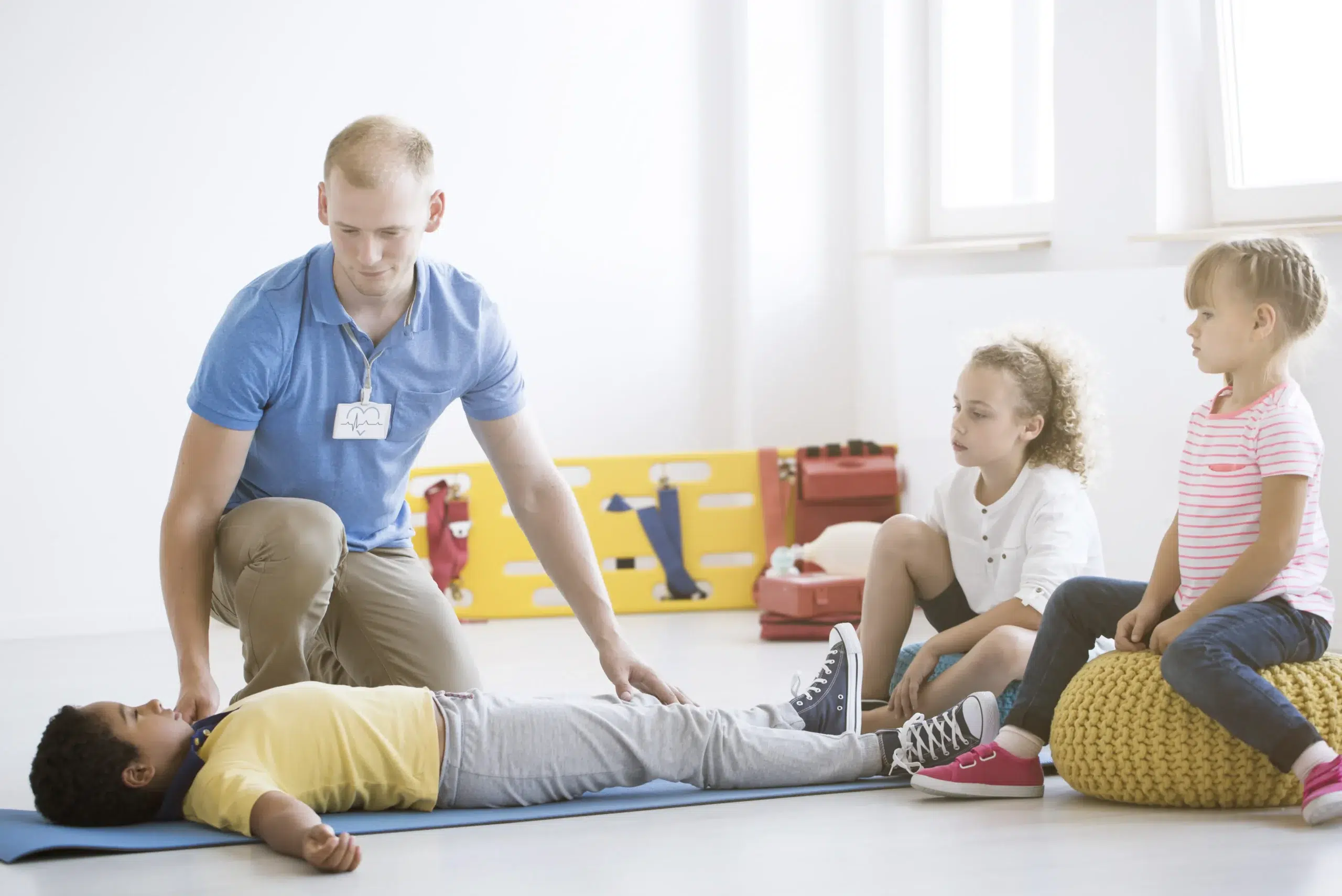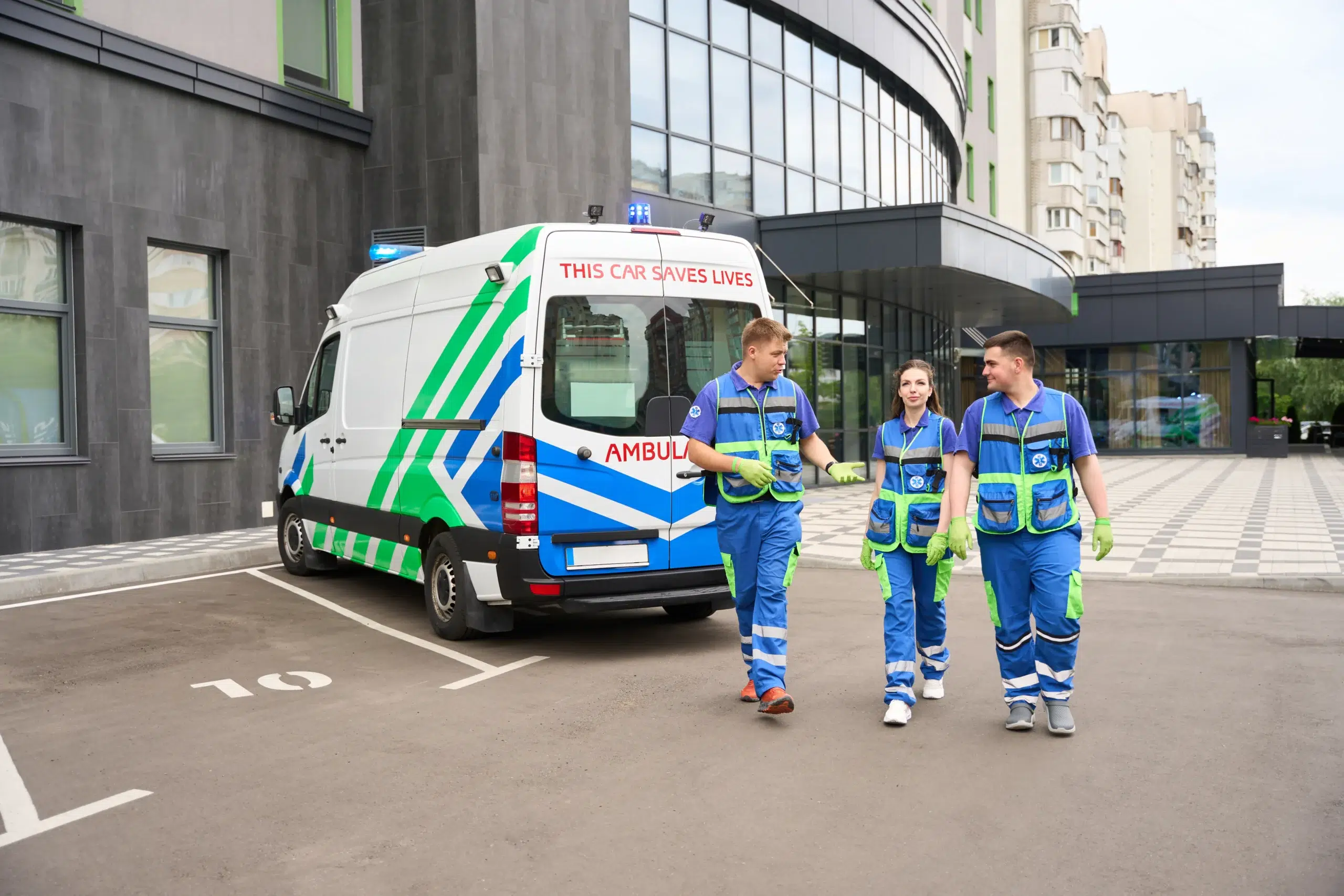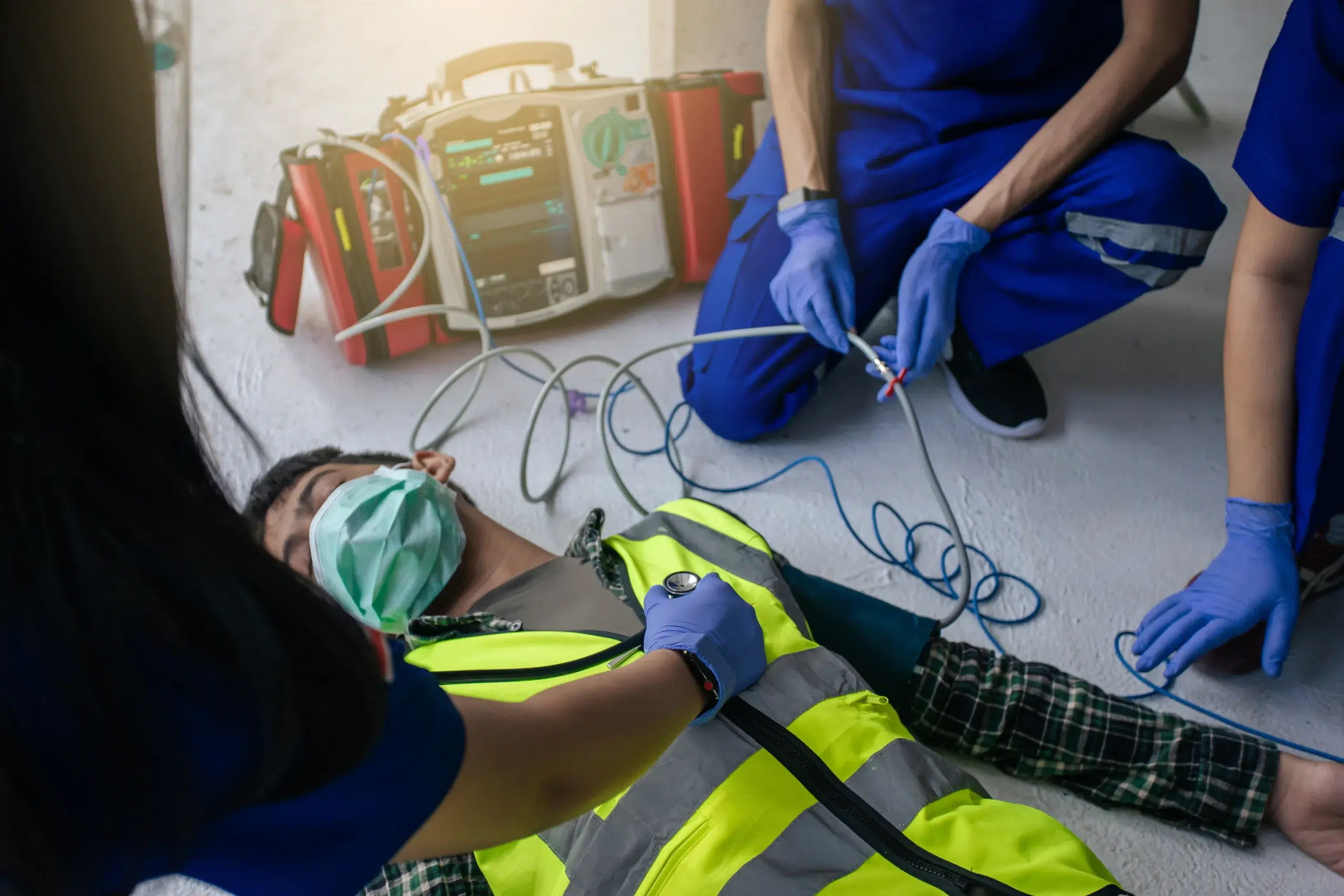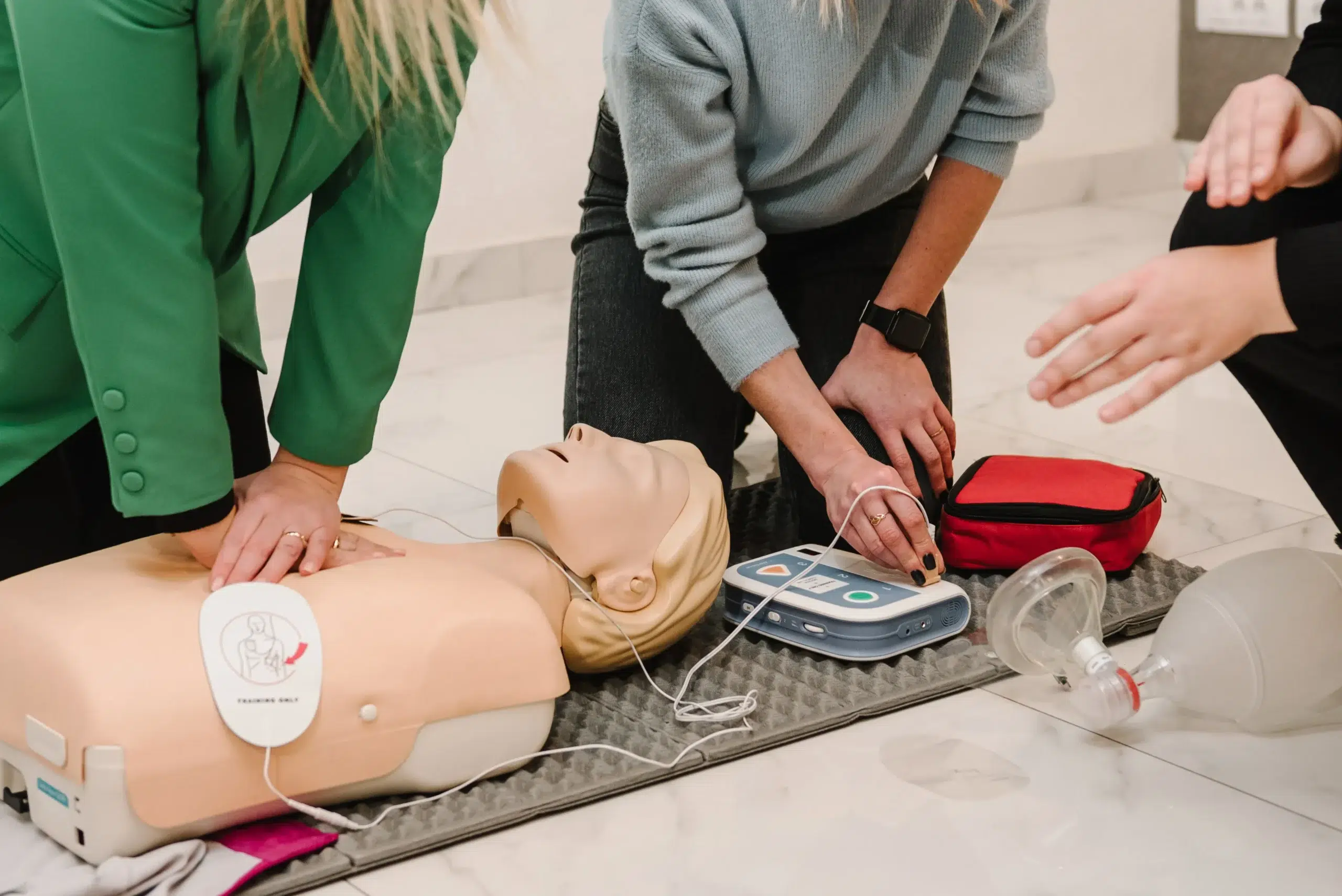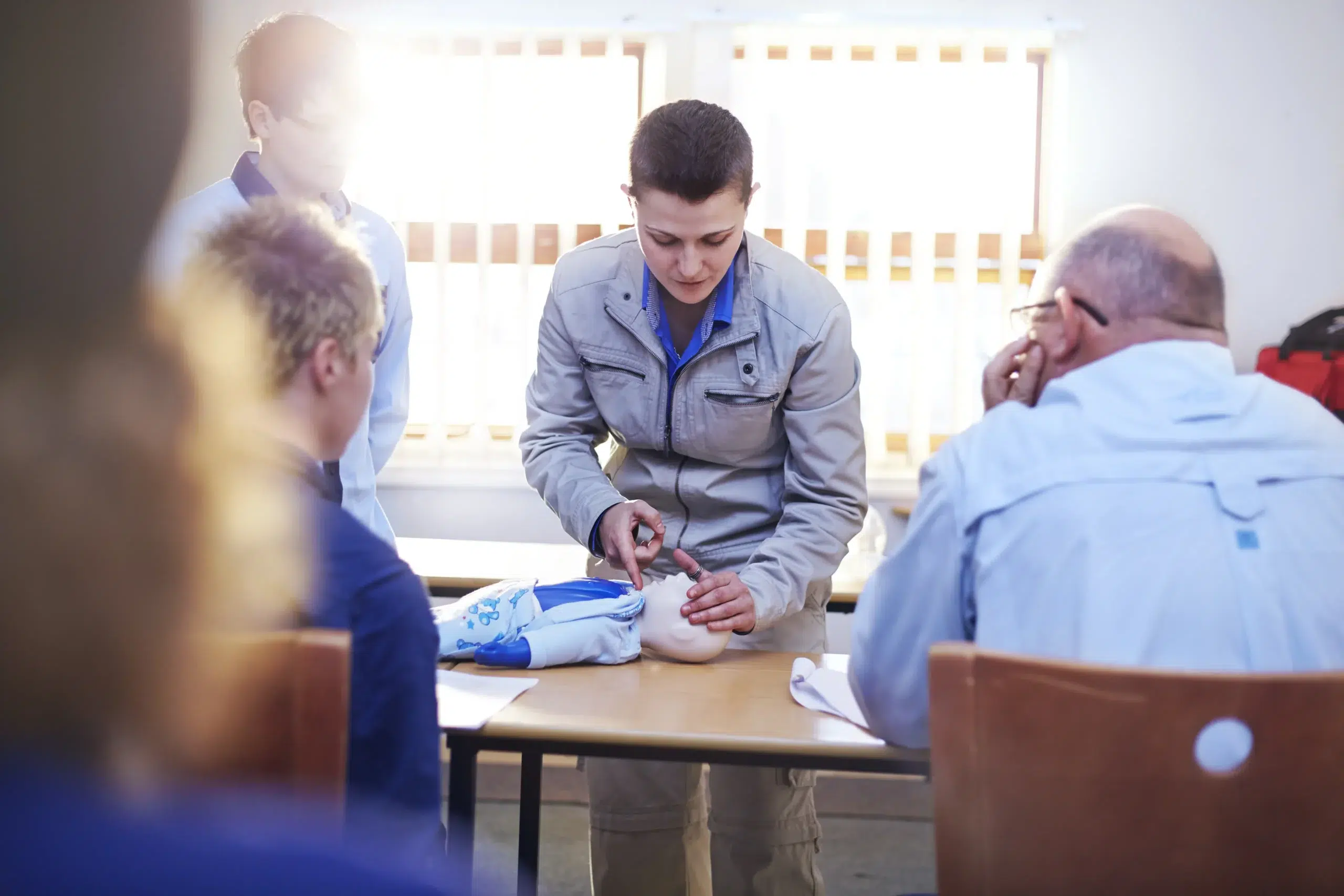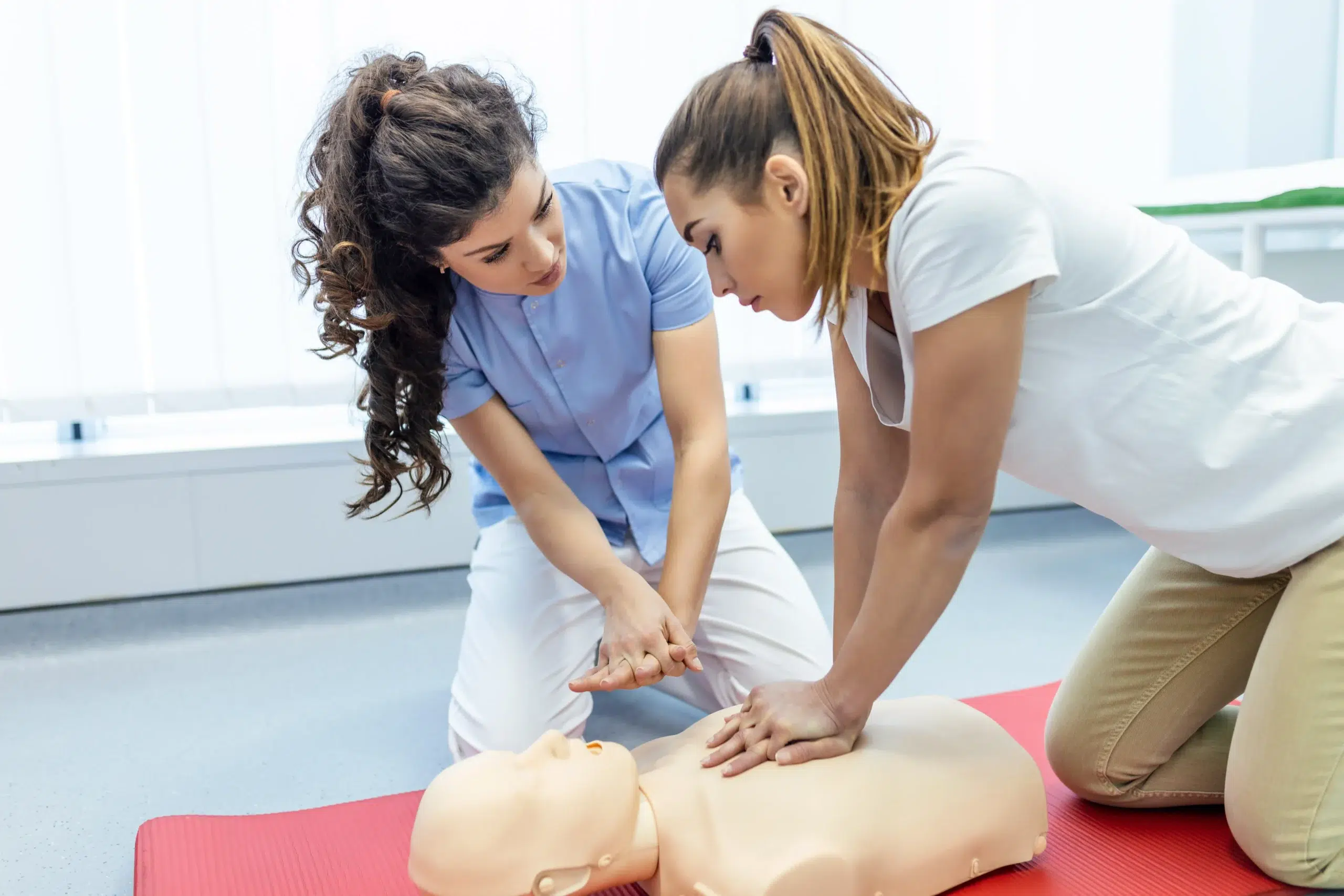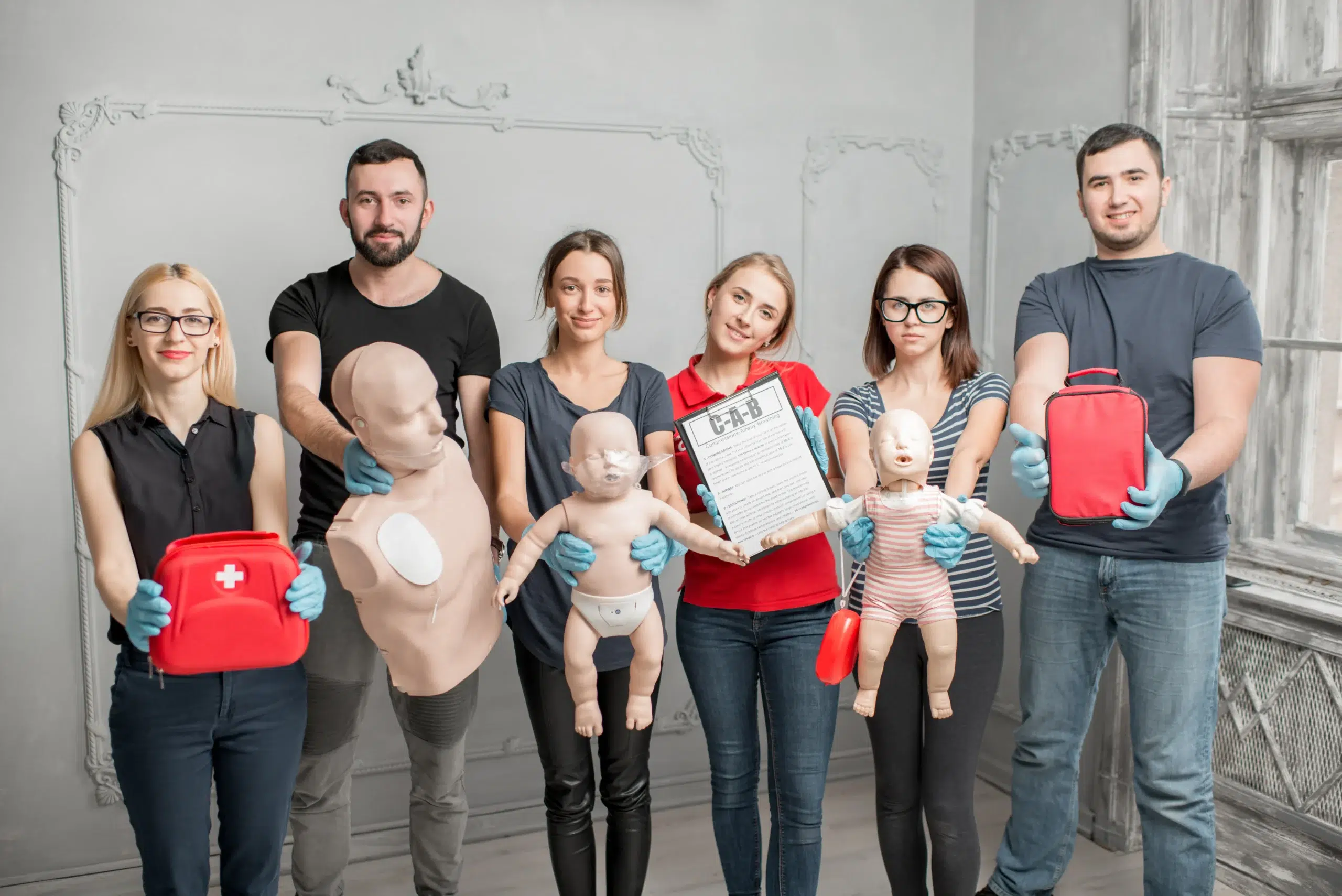Emergencies can happen anytime, anywhere. Knowing how to respond effectively can make all the difference. If you’re looking for CPR and first-aid training in Walnut Creek, you’ve come to the right place. This guide breaks down the various types of CPR and first-aid certifications available, including BLS, ACLS, PALS, and more. We’ll explore local training centers, discuss costs and discounts, and debunk common myths about CPR and first aid. Whether you’re a healthcare provider seeking recertification or a parent wanting to learn essential life-saving skills, this guide will help you navigate the process of finding the right CPR and first-aid training in Walnut Creek.
Key Takeaways
- Find the right CPR and first aid training for your needs: Whether you’re a healthcare professional, a parent, or simply want to be prepared, certifications like CPR, BLS, ACLS, and PALS empower you to handle emergencies.
- Access convenient and affordable training in your area: Explore local training centers and flexible scheduling options to fit your busy lifestyle. Look for providers like Pleasant Hill CPR Classes that offer a low-price guarantee.
- Stay current with life-saving techniques: Maintain your certification and pursue continuing education opportunities to ensure you’re always prepared to respond effectively in a crisis.
What is CPR and First Aid?
Cardiopulmonary resuscitation (CPR) is for someone who is unconscious, not breathing, or only gasping—the signs of a cardiac arrest. It combines chest compressions and rescue breaths to keep blood and oxygen flowing until paramedics arrive. The American Heart Association stresses how important it is for everyone to learn CPR. These skills can truly make a difference in a life-or-death situation.
First aid covers a wider range of situations. It’s the immediate care you give for injuries like cuts and burns, or illnesses like allergic reactions. The goal of first aid is to keep someone stable and prevent further harm until professional medical help arrives. Learning both CPR and first aid gives you the skills and confidence to handle emergencies, whether you’re a healthcare professional, a caregiver, or just someone who wants to be prepared.
CPR and First Aid Certifications in Walnut Creek
Knowing which CPR and First Aid certification is right for you can feel overwhelming. This section breaks down the different types of certifications available in Walnut Creek. Whether you’re a healthcare provider, work with children, or simply want to be prepared for emergencies, there’s a course that fits your needs.
CPR Certification
CPR training equips you with essential life-saving skills. Whether you’re a healthcare professional, childcare provider, or simply want to be prepared, CPR training provides the knowledge and confidence to respond effectively in emergencies. You’ll learn how to recognize the signs of a cardiac arrest and perform chest compressions and rescue breaths. This foundational course empowers you to make a difference when seconds count. Our CPR certification courses offer comprehensive training to get you started.
Basic Life Support (BLS)
BLS certification goes a step further than general CPR training, providing the skills you need to respond confidently during medical emergencies. Our BLS certification course adheres to American Heart Association (AHA) guidelines and covers essential techniques for healthcare providers, including high-quality CPR, ventilation techniques, and the use of an AED. These skills are crucial for professionals working in hospitals, clinics, and other healthcare settings.
Advanced Cardiovascular Life Support (ACLS)
ACLS courses are designed for healthcare professionals who respond to cardiovascular emergencies. These courses focus on advanced life support techniques, including airway management, rhythm recognition, and effective team dynamics. ACLS certification is essential for physicians, nurses, paramedics, and other healthcare providers working in critical care. Contact us to learn more about our ACLS training options.
Pediatric Advanced Life Support (PALS)
PALS courses are tailored for healthcare providers who manage critically ill infants and children. This training emphasizes the importance of early recognition and intervention in pediatric emergencies. PALS certification covers essential topics such as respiratory distress, shock management, and post-resuscitation care. It’s a vital certification for pediatricians, nurses, and other healthcare professionals working with young patients. Our PALS certification course can help you gain these essential skills.
First Aid Certification
First Aid training covers a wide range of emergency situations, equipping you with the skills to provide immediate care until professional help arrives. You’ll learn how to treat common injuries like cuts, burns, and sprains, as well as how to manage more serious situations like allergic reactions and choking. Basic First Aid courses are open to anyone wanting to learn these life-saving skills. Explore our First Aid training to find the right course for you.
Find Qualified CPR & First Aid Instructors in Walnut Creek
Finding the right CPR and First Aid instructor is crucial for an effective learning experience. Whether you’re a healthcare provider seeking recertification or a parent wanting to prepare for emergencies, Walnut Creek has several options for high-quality instruction.
American Heart Association Certified Instructors
Many qualified instructors in Walnut Creek are certified by the American Heart Association. This certification ensures they meet the AHA’s rigorous standards for CPR and First Aid training. Look for classes offering certifications in BLS, ACLS, PALS, and First Aid. You can often find combined CPR and First Aid certification courses in Walnut Creek, giving you a well-rounded set of emergency response skills.
EMT and Paramedic Trainers
Some CPR and First Aid courses are taught by EMTs and paramedics. Their real-world experience adds a valuable dimension to the training, offering unique insights and practical tips. Contact us to learn more about instructors with these backgrounds.
Local Training Centers
Several training centers in and around Walnut Creek offer CPR and First Aid classes. Here are a few options:
Pleasant Hill CPR Classes
Pleasant Hill CPR Classes offers a range of AHA-certified courses, including CPR, BLS, ACLS, PALS, and First Aid. They focus on providing convenient and affordable training, backed by a low price guarantee.
CPR Education
CPR Education provides CPR and First Aid training to individuals and businesses in Pleasant Hill and surrounding areas. They emphasize practical skills and real-world scenarios. Visit their website for more information.
Walnut Creek CPR Training Center
The CPR Training Center of Concord offers group and corporate on-site training for various AHA-certified courses. This is a convenient option for businesses and organizations, as they bring the training directly to you. You can find their contact information and course details on their website.
American Red Cross
The American Red Cross also offers CPR and First Aid training in the Walnut Creek area. Check their website for class schedules and locations.
Walnut Creek Community Emergency Response Team (CERT)
While not a traditional training center, Walnut Creek CERT offers basic first aid training as part of its emergency preparedness program. This can be a good introduction for those seeking foundational knowledge. Learn more about Walnut Creek CERT on the City of Walnut Creek website.
CPR & First Aid Class Costs & Discounts
Knowing the cost of CPR and first aid training is a practical first step. Pricing varies depending on the level of certification, the course format (in-person or blended learning), and whether you’re taking a class individually or as part of a group. Let’s break down the different pricing options.
Individual Class Pricing
Individual class prices are generally based on the type of certification you’re pursuing. A basic CPR and First Aid class will likely have a different price than a more advanced course like ACLS or PALS. Pleasant Hill CPR Classes offers a range of courses, so you can find training at the right price. Contact us for up-to-date pricing information.
Group Training Discounts
If you’re training a group, such as workplace staff or a community organization, group discounts can significantly lower the per-person cost. These discounts make it more affordable to equip multiple people with life-saving skills. Contact Pleasant Hill CPR Classes to discuss your group training needs and explore discounts. We can help you organize a training session that works for your group’s schedule and budget.
Package Deals and Bundles
Bundling courses together can lead to savings. For instance, combining CPR and First Aid training is often less expensive than taking each course separately. Check with Pleasant Hill CPR Classes for package deals that might fit your requirements.
Low Price Guarantee Options
Pleasant Hill CPR Classes is committed to making CPR and first aid training accessible. Our low-price guarantee ensures you’re getting the best value. If you find a comparable course at a lower price, we’ll match it. This commitment to affordability helps more people learn these essential skills.
Find CPR & First Aid Class Locations & Schedules
Finding the right CPR and First Aid class is easier than you think, thanks to numerous training centers and flexible schedules. Whether you’re in Walnut Creek, Concord, or Pleasant Hill, convenient options are available.
Training Centers and Facilities
Walnut Creek has several training centers offering American Heart Association (AHA) certified courses. Pleasant Hill CPR Classes, for example, offers a range of courses, including BLS, ACLS, PALS, and First Aid. You can also find CPR and First Aid training through organizations like the American Red Cross and local community programs. Many hospitals and healthcare facilities also provide training for both healthcare providers and the public.
Flexible Class Timings
Class schedules are designed to accommodate busy lifestyles. Many training centers offer weekday and weekend options, including evening classes. This flexibility makes it easier to fit training into your schedule, whether you’re a working professional, student, or parent. Contact Pleasant Hill CPR Classes to find a time that works for you. They specialize in RQI programs for medical professionals seeking an efficient certification process.
Daily Availability and Weekend Options
With classes available daily, you can find a CPR and First Aid class that fits your needs. Weekend options are particularly helpful for those with commitments during the week. Check with specific training centers for their schedules and availability. Pleasant Hill CPR Classes offers a low price guarantee, making quality training affordable.
Register for a Class
Registering for a class is typically straightforward. Most training centers allow online registration through their websites. You can also contact the training center directly by phone or email to ask about schedules, fees, and available courses. Don’t hesitate to ask any questions – training centers are there to help you find the right class.
Why Get CPR & First Aid Certified?
Knowing CPR and first aid can make a real difference in critical situations. It empowers you to act quickly and effectively when every second counts, whether at home, in the workplace, or out in your community. From minor injuries to life-threatening emergencies, these skills equip you to provide immediate care and potentially save lives. Let’s explore some key reasons why getting certified is a valuable investment.
Emergency Preparedness
CPR and first aid training gives you the skills to handle emergencies. Imagine you’re at a family gathering when someone suddenly collapses. Instead of feeling helpless, your training kicks in. You can assess the situation, perform CPR, and administer basic first aid until professional help arrives. This immediate response can significantly improve the outcome, especially in cases like cardiac arrest or choking. Being prepared for such events brings peace of mind and empowers you to act confidently in a crisis. Pleasant Hill CPR classes offer a range of courses to equip you for these situations.
Workplace Requirements
Many professions require CPR and first aid certification, particularly in healthcare, childcare, and education. Employers need to know their staff can handle emergencies on the job. Having these certifications not only meets these requirements but also demonstrates your commitment to safety and preparedness. It can even enhance your resume and create new career opportunities. Check with your employer or professional organization to see if certification is required in your field.
Community Safety Impact
When more people in a community know CPR and first aid, everyone benefits. It creates a network of trained individuals ready to respond to emergencies, from a car accident to a medical crisis at a public event. This widespread knowledge improves community health and safety. Consider participating in group CPR training with your neighbors or colleagues to build a more resilient community.
Confidence in Crisis Situations
One of the most valuable aspects of CPR and first aid training is the confidence it instills. Knowing what to do in an emergency reduces panic and allows you to act decisively. This confidence can be crucial not only for the person needing help but also for those around you. It allows you to take charge, provide reassurance, and coordinate efforts until professional help arrives. Understanding common misconceptions about CPR and first aid can further build your confidence and encourage you to take action when needed.
CPR & First Aid Myths Debunked
It’s easy to misunderstand CPR and first aid, especially if your only experience is from TV medical dramas. Let’s clear up some common misconceptions:
Myth: CPR Alone Restarts the Heart
Many people think CPR single-handedly restarts the heart. In reality, CPR primarily keeps blood flowing to vital organs until paramedics arrive. It buys precious time, preventing further damage while awaiting advanced medical care. This critical understanding encourages action during emergencies, rather than hesitant inaction based on a misunderstanding of CPR’s function. Learning CPR empowers you to provide immediate support and potentially save a life.
Myth: Only Medical Professionals Can Perform CPR
Another misconception is that only doctors and nurses can perform CPR. The truth is, anyone can learn this life-saving skill, and its value in emergencies cannot be overstated. While medical professionals have advanced training, even basic CPR from a bystander can dramatically improve survival odds. Pleasant Hill CPR Classes offers training for everyone, empowering anyone to act confidently in a crisis. Contact us to learn more.
Myth: Mouth-to-Mouth is Always Necessary
Forget what you’ve seen on TV—mouth-to-mouth isn’t always required. Current American Heart Association guidelines often recommend compression-only CPR, especially for those without formal training. This simplifies the process and encourages more people to act quickly when witnessing a cardiac event. This approach makes providing aid in critical situations less intimidating.
Myth: First Aid Training is Only for Healthcare Workers
Just like CPR, first aid training isn’t just for medical professionals. These skills are valuable for everyone, from teachers and coaches to parents and office workers. Knowing how to treat minor injuries, control bleeding, or recognize the signs of a stroke can make a real difference in any setting. Learn more about how first aid training empowers you to help those around you. Consider taking a class to gain the confidence and skills to handle everyday medical situations.
Community CPR & First Aid Training
Learning CPR and first aid is a valuable skill, empowering you to help others in need. It’s also a fantastic way to connect with your local community. Here in Walnut Creek, Concord, and Pleasant Hill, we have many opportunities to learn these life-saving skills and participate in community-focused initiatives.
Local Events and Demonstrations
Keep an eye out for local events and demonstrations offering free or low-cost CPR and first aid training. Organizations like the American Red Cross frequently host these events, providing a great introduction to these essential skills. Group training is a smart, cost-effective option for organizations and businesses. Learn more about group CPR training options in Walnut Creek.
Partnerships with Schools and Businesses
Many local schools and businesses partner with organizations like Pleasant Hill CPR Classes to offer training programs to their students and employees. These partnerships help create a more prepared and resilient community. The Walnut Creek Community Emergency Response Team (CERT) is another excellent example of a community-based group dedicated to disaster preparedness and response training. Consider partnering with a local organization to bring CPR and first aid training to your workplace or school.
Incentives for Participation
Some organizations offer incentives for individuals and groups to participate in CPR and first aid training. These might include discounts on future classes or even free certification upon completion of a course. Check with local training providers like ALLCPR to explore available incentives.
Educational Campaigns
Throughout the year, various organizations conduct educational campaigns to raise awareness about the importance of CPR and first aid. These campaigns often involve community outreach and helpful resources to connect people with training opportunities. Staying informed about these campaigns can help you stay up-to-date on the latest guidelines. Contact your local fire department or community center to learn more about upcoming educational opportunities.
Maintain Your CPR & First Aid Certification
Knowing CPR and first aid empowers you to handle emergencies, but staying up-to-date is crucial. Like any skill, CPR and first aid techniques evolve. Regularly refreshing your knowledge ensures you’re prepared to provide the best possible care when needed.
Renewal Requirements
CPR and first aid certifications typically expire after two years, as best practices and guidelines are frequently updated to reflect the latest medical research. Mark your certification expiration date and plan to renew your certification beforehand. This ensures you’re always ready to respond confidently in a crisis.
Continuing Education Opportunities
Even if your certification isn’t due for renewal, consider refresher courses or continuing education. This proactive approach reinforces your skills and introduces you to any new developments in CPR and first aid techniques. Online and in-person options are widely available, often aligned with American Heart Association guidelines, offering flexibility for busy schedules.
Stay Updated with Latest Techniques
For healthcare professionals, staying current with the latest resuscitation techniques is especially important. The American Heart Association’s RQI program offers an efficient way to maintain BLS, ACLS, and PALS certifications. These advanced certifications equip medical professionals with the skills to manage complex cardiovascular and pediatric emergencies. Regularly reviewing these techniques through programs like RQI ensures you can deliver the most effective care. Courses for BLS, ACLS, and PALS are designed for healthcare providers to meet these ongoing training needs.
Enroll in CPR & First Aid Classes
So, you’re ready to become CPR and First Aid certified? Great! Knowing how to respond to emergencies can truly make a difference. This section breaks down how to find the right course and get prepared.
Research Available Courses
First, determine what type of training you need. Are you looking for a basic CPR and First Aid course for personal knowledge? Or do you need a specific certification like Basic Life Support (BLS) for a healthcare job? Pleasant Hill CPR Classes offers a range of American Heart Association courses, including combined CPR and First Aid certification. Review their website to see what fits your needs. You can also explore other training centers, like those mentioned in our Pleasant Hill CPR training guide. Many providers offer various certification levels, from basic to advanced, allowing you to find the perfect match.
Contact Training Centers
Once you have a few courses in mind, contact the training centers. Ask about class schedules, costs, and what the training includes. Pleasant Hill CPR Classes is known for its excellent customer service and can answer any questions. You can also find contact information online for other local providers like CPR Education. Compare options to find the best fit for your schedule and budget. Many centers offer daily classes, making it easy to find a convenient time.
Prepare for Your Certification
Before class, take a few steps to prepare. Review any pre-course materials from the training center. This might include basic anatomy or information about common emergencies. Get ready to participate actively in the training. CPR and First Aid classes involve hands-on practice, so be prepared to learn the techniques. The goal is to build confidence and equip you to handle emergencies. This article on common CPR and First Aid misconceptions is a helpful resource.
Related Articles
- Workplace CPR and First-Aid Training Benefits
- CPR Classes in Walnut Creek: Your Complete Guide – Pleasant Hill CPR Classes
- American Heart Association (AHA) Training in Concord – Pleasant Hill CPR Classes
- Online BLS Classes in Walnut Creek: Your Complete Guide – Pleasant Hill CPR Classes
- Pediatric CPR & First-Aid Training in Pleasant Hill – Pleasant Hill CPR Classes
Frequently Asked Questions
What’s the difference between CPR and First Aid? CPR focuses on life-threatening situations where someone has stopped breathing or has no pulse. First aid addresses a broader range of injuries and illnesses, from minor cuts to more serious conditions like allergic reactions. Both are valuable skills to have, but they serve different purposes.
Which CPR/First Aid certification is right for me? The best certification depends on your needs. A basic CPR/First Aid course is good for general knowledge and community preparedness. Healthcare providers typically need BLS, ACLS, or PALS, depending on their specialization. If you work with children, PALS is essential. Consider your current job, future career goals, and personal interests when choosing.
How much do CPR and First Aid classes cost? Costs vary based on the type of certification, the training center, and whether you take a class individually or as part of a group. Group discounts and package deals are often available. Check with different providers like Pleasant Hill CPR Classes for their pricing and any discounts they offer. They even have a low-price guarantee.
How can I find a CPR/First Aid class near me? Several training centers in Walnut Creek, Concord, and Pleasant Hill offer various CPR and First Aid courses. Look online for local providers, check community centers, or contact hospitals and healthcare facilities. Many offer flexible schedules, including weekend and evening classes, to accommodate different needs.
How do I maintain my CPR/First Aid certification? Certifications usually expire after two years. To stay current, renew your certification before it expires. Even if your certification isn’t expiring soon, consider refresher courses or continuing education to keep your skills sharp and learn the latest techniques. For healthcare professionals, programs like RQI offer an efficient way to maintain advanced certifications.
